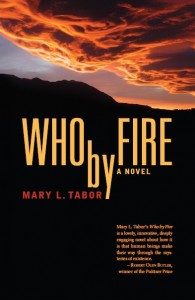


Outer Banks Publishing Group author Mary L. Tabor’s literary novel, Who by Fire, won the Notable Indie award for best books in 2013 by online magazine Shelf Unbound.
Shelf Unbound’s second annual writing competition had over 1,000 entries with 100 titles chosen as winners, according to Shelf Unbound’s publisher, Margaret Brown.
Mary’s book was featured in the December-January 2014 special edition of Shelf Unbound magazine (Page 35).
“Thanks to the Internet, artists can be discovered by a global audience-and in some cases even be funded by philanthropic strangers. The challenge, of course, is the discovery part-how do the indie artist and the indie audience find each other? That’s what this special issue of Shelf Unbound-honoring the winner, finalists, and notable entries in our second writing competition for best indie book-is all about,” wrote Ms. Brown.
Congratulations to Mary for her notable achievement!
If you are in the Washington DC area on Sunday. October 13 attend the Local Author Fair featuring Outer Banks Publishing Group author Mary L. Tabor. Enjoy some fine wine and cheese while discussing Mary’s newest novel, Who by Fire, a literary gem about a complex tale of love, betrayal, and the search for one self.
Fifteen additional authors will also be on hand to discuss their books.
Here is what Richard Kramer, writer and producer of the TV show Thirtysomething, wrote about Mary L. Tabor’s sensual, sensitive novel, WHO BY FIRE.
“This brief, elegant, passionate novel accumulates and gathers force like a poem, in which language is compressed and edited and somehow bursts its bounds as it goes along. It made me want to write a book just like it, although I don’t have Mary Tabor’s wisdom and insight and willingness to stay so intently focused. Maybe someday … Until then, I can heartily recommend this, maybe especially to people who haven’t written a novel but who want to, because WHO BY FIRE can show you what a novel can be.”

Who By Fire
Paperback: 248 pages
Language: English
Product Dimensions: 6 x 9 inches
ISBN-10: 0982993145
ISBN-13: 978-0-9829931-4-9
Publication Date: November 2012
 Here’s what Richard Kramer, writer and producer of the TV show Thirtysomething, among others, and author of These Things Happen, a novel he wrote and has adapted for an HBO series produced by Oprah Winfrey wrote about Mary L. Tabor’s sensual, sensitive novel, WHO BY FIRE.
Here’s what Richard Kramer, writer and producer of the TV show Thirtysomething, among others, and author of These Things Happen, a novel he wrote and has adapted for an HBO series produced by Oprah Winfrey wrote about Mary L. Tabor’s sensual, sensitive novel, WHO BY FIRE.
“This brief, elegant, passionate novel accumulates and gathers force like a poem, in which language is compressed and edited and somehow bursts its bounds as it goes along. It made me want to write a book just like it, although I don’t have Mary Tabor’s wisdom and insight and willingness to stay so intently focused. Maybe someday … Until then, I can heartily recommend this, maybe especially to people who haven’t written a novel but who want to, because WHO BY FIRE can show you what a novel can be.”
Mary L. Tabor with Richard Kramer 08/07 by rarebirdradio | Books Podcasts.
Listen to Mixcloud’s interview with Outer Banks Publishing Group author Mary L. Tabor. She discusses her newest novel, Who by Fire, where one of the main characters who died, lives throughout the story.
The interview starts at 50:26 into the broadcast.
Mary L Tabor 03-14-13 by Total Education Network on Mixcloud
Mixcloud connects radio content to listeners more effectively. Mixcloud is re-thinking radio by joining the dots between radio shows, Podcasts and DJ mixes. We refer to them as Cloudcasts – audio shows that are stored in the “cloud” and available to be streamed on-demand.
In an unprecedented move, the Wiley Literary Agency struck a deal with Amazon to publish 20 classic titles as ebooks on the Kindle. According to reports, this is the first time a literary agency moved into the publishing business.
Will this be a tren d as agencies struggle to survive in the dwindling print market? It might be. An agency would sign on an author, retain electronic publishing rights and then sell print rights to traditional publishers.
d as agencies struggle to survive in the dwindling print market? It might be. An agency would sign on an author, retain electronic publishing rights and then sell print rights to traditional publishers.
Agency revenues would increase considerably for ebooks, especially with the current structure where agencies only receive 15% of the author’s royalties.
However, the big question is will traditional publishers go along with this scenario or refuse to publish an author unless they retain electronic rights?
Will this be beneficial to authors?
Read Stephen Windwalker’s column for more information on this emerging development.
Read the report from The New York Times.
We hear it all the time. The electronic book readers like Amazon’s and Sony’s eReader are going to be the downfall of printed books. If you believe that you may have been one of the folks in Columbus’ day who believed the world was flat. Don’t worry. It won’t happen at least for a very long time.
The eReaders are just another distribution channel for books. If anything, eReaders are going to allow more people to access more content than ever before. We hear it from Kindle owners all the time that their Kindles are maxed out – they cannot fit anymore books on these devices. Luckily for them Amazon allows users to store books online on their Kindle account. They just have to switch them out from the account to the Kindle. And people with mobile devices like phones and PDAs are only limited by the amount of memory in those devices.
Well, for all those people out there who don’t like change, book eReaders and other mobile reading devices like the iPhone, iTouch, Blackberry, Palm Pilot and the entire family of Windows Mobile software devices are here to stay. Whether you passively ignore these devices or actively denounce them, the eReader trend is coming at you like a steam roller and there is nothing you can do. Go with the flow or be flattened.
A case in point is Amazon’s launch of the European version of the Kindle (See the story on Bloomberg.com). Before the launch, Europeans had to settle for the American Kindle version and could only download books after they downloaded them to their PCs. Now they can download books wirelessly directly to the Kindle in more than 100 countries all over Europe. Now Europeans like us Americans only have to think of a book and in less than 60 seconds they will have the entire book ready to read on their Kindles.
And according to TIME online, “2009 is a breakout year for e-readers,” says Sarah Rotman Epps, an analyst with Forrester Research. “But we’re still in the early stages.”
More than 17 Kindle-competitors are already on the market or expected to hit the market by 2010, according to TIME. The major players include Apple and Microsoft, Asustek, a Taiwanese company, Samsung, LG, IREX, Interead and Fujitsu with a full color e-ink display.
Sony’s Family of electronic book readers – Courtesy of Sony
Cool technology. Disruptive technology. Revolutionary technology. The voices are clear.
So what does it all mean for our rich literary legacy? Will our literary future simply morph into something unrecognizable? Will it vanish completely? Maybe. Young people are writing novels on cell phones in Japan. Several authors have attempted to write and serialize novels on Twitter. Hundreds of books were first written on blogs and then turned into full length books in print.
Most young people don’t read books; older people read books. Females read more books than males. A whole new language has been created for texting that uses mostly acronyms and makes understanding shorthand a cake walk.
Again allay your fears.
Clive Thompson, a writer for , reported in the September 2009 article, that a college professor found just the opposite – that young people are much more prolific than their parents and grandparents.
isn’t so sure. Lunsford is a professor of writing and rhetoric at , where she has organized a mammoth project called the to scrutinize college students’ prose. From 2001 to 2006, she collected 14,672 student writing samples—everything from in-class assignments, formal essays, and journal entries to emails, blog posts, and chat sessions. Her conclusions are stirring.
“I think we’re in the midst of a literacy revolution the likes of which we haven’t seen since Greek civilization,” she says. For Lunsford, technology isn’t killing our ability to write. It’s reviving it—and pushing our literacy in bold new directions.
The first thing she found is that young people today write far more than any generation before them. That’s because so much socializing takes place online, and it almost always involves text. Of all the writing that the Stanford students did, a stunning 38 percent of it took place out of the classroom—life writing, as Lunsford calls it. Those Twitter updates and lists of 25 things about yourself add up.
It’s almost hard to remember how big a paradigm shift this is. Before the Internet came along, most Americans never wrote anything, ever, that wasn’t a school assignment. Unless they got a job that required producing text (like in law, advertising, or media), they’d leave school and virtually never construct a paragraph again.”
She’s right about technology “pushing our literacy in bold new directions” – everything written is shorter, faster, more efficient. Books are shorter; chapters are shorter to reflect everyone’s busier, faster lifestyle and the writing is concise and targeted written to get to the point quickly and efficiently.
Even , the former Executive Editor-in-Chief of Random House and fiction editor of laments about the Internet in his article, ” in the Barnes and Noble Review.
“(Speaking of shortness, the attention-distraction of the Internet and the intrusion of work into everyday life, by means of electronic devices, appear to me to have worked, maybe on a subliminal level, to reduce the length of the average trade hardcover book.)”
Does that mean we will never see great classics like Charles Dicken’s, A Christmas Carol or Great Expectations? On the contrary. Writers are the bellwethers of our time, and their writings will reflect our lifestyles, our cultures, and our pace of living. Besides, when was the last time a friend proclaimed, “I just finished, War and Peace, and now I can start David Copperfield.”
While books may be shorter, there will always be classics some already written, some to be written, whether they are traveling at light speed as zeros and ones over the airwaves or inked permanently onto the printed page.